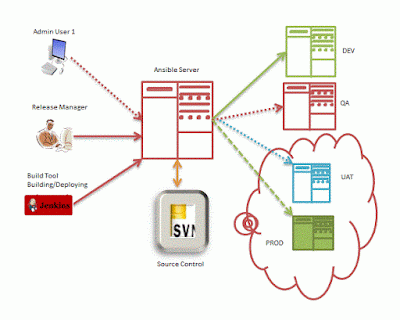Ansible playbook are just like normal file with ".yml" extension. Playbook (.yml) file understand set of define syntax. YAML is easier for humans to read and write than other common data formats like XML or JSON.
Create the dir/file as mention below:
[vagrant@www.tutorialbyexample.com ansible]$ pwd
/ansible
[vagrant@www.tutorialbyexample.com ansible]$ ls -R
.:
etc inventory provision.sh
./etc:
ansible
./etc/ansible:
roles site.yml web.yml
./etc/ansible/roles:
zip
./etc/ansible/roles/zip:
tasks
./etc/ansible/roles/zip/tasks:
main.yml
./inventory:
dev
Let's discussed more details for file:
[vagrant@www.tutorialbyexample.com ansible]$ vi inventory/dev (There is no extensions)
local ansible_ssh_port=2222 ansible_ssh_host=127.0.0.1 ansible_connection=local
[web-servers]
local
[vagrant@www.tutorialbyexample.com ansible]$ vi provision.sh
sudo ansible-playbook -vvvv -i /tmp/inventory/$1 /ansible/site.yml --extra-vars
[vagrant@www.tutorialbyexample.com ansible]$ vi etc/ansible/site.yml
---
- include: web.yml
[vagrant@www.tutorialbyexample.com ansible]$ vi etc/ansible/web.yml
---
- hosts: web-servers
remote_user: root
sudo: yes
roles:
- zip
[vagrant@www.tutorialbyexample.com ansible]$ vi etc/ansible/roles/zip/tasks/main.yml
---
- name: Install zip/unzip util
yum: name={{ item }} state=present
with_items:
- "zip"
- "unzip"
Run it:
[vagrant@www.tutorialbyexample.com ansible]$ ./provision.sh dev
PLAY [web-servers] *******************************************
GATHERING FACTS *************************************
<127.0.0.1> REMOTE_MODULE setup
ok: [local]
TASK: [zip | Install zip/unzip util] ******************************************
<127.0.0.1> REMOTE_MODULE yum name=zip,unzip state=present
PLAY RECAP ********************************************************************
local : ok=2 changed=0 unreachable=0 failed=0
Great, zip utility installed with help of Ansible play book or .yml file with roles.
Video on Youtube: https://www.youtube.com/watch?v=r0DDwWExBC4
References
 |
| Ansible Flow |
Create the dir/file as mention below:
[vagrant@www.tutorialbyexample.com ansible]$ pwd
/ansible
[vagrant@www.tutorialbyexample.com ansible]$ ls -R
.:
etc inventory provision.sh
./etc:
ansible
./etc/ansible:
roles site.yml web.yml
./etc/ansible/roles:
zip
./etc/ansible/roles/zip:
tasks
./etc/ansible/roles/zip/tasks:
main.yml
./inventory:
dev
Let's discussed more details for file:
[vagrant@www.tutorialbyexample.com ansible]$ vi inventory/dev (There is no extensions)
local ansible_ssh_port=2222 ansible_ssh_host=127.0.0.1 ansible_connection=local
[web-servers]
local
[vagrant@www.tutorialbyexample.com ansible]$ vi provision.sh
sudo ansible-playbook -vvvv -i /tmp/inventory/$1 /ansible/site.yml --extra-vars
[vagrant@www.tutorialbyexample.com ansible]$ vi etc/ansible/site.yml
---
- include: web.yml
[vagrant@www.tutorialbyexample.com ansible]$ vi etc/ansible/web.yml
---
- hosts: web-servers
remote_user: root
sudo: yes
roles:
- zip
[vagrant@www.tutorialbyexample.com ansible]$ vi etc/ansible/roles/zip/tasks/main.yml
---
- name: Install zip/unzip util
yum: name={{ item }} state=present
with_items:
- "zip"
- "unzip"
Run it:
[vagrant@www.tutorialbyexample.com ansible]$ ./provision.sh dev
PLAY [web-servers] *******************************************
GATHERING FACTS *************************************
<127.0.0.1> REMOTE_MODULE setup
ok: [local]
TASK: [zip | Install zip/unzip util] ******************************************
<127.0.0.1> REMOTE_MODULE yum name=zip,unzip state=present
PLAY RECAP ********************************************************************
local : ok=2 changed=0 unreachable=0 failed=0
Video on Youtube: https://www.youtube.com/watch?v=r0DDwWExBC4
References
http://www.ansible.com/
how to installed ansible and ansible playbook?
ReplyDeleteThis above information really Good beginners are looking for these type of blogs, Thanks for sharing article on Devops Online Training Hyderabad
ReplyDelete